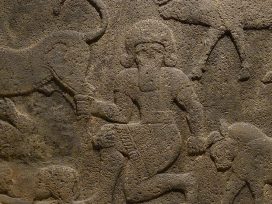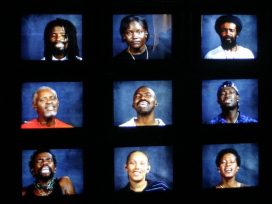Dejan Sorak
Covjek bez dna
(“A fathomless man”, Algoritam, Zagreb 2011)
Dejan Sorak’s novel Covjek bez dna (“A fathomless man”) consists of three separate stories chronologically organized into one whole, however in such a way that they can be read separately. They narrate the life of Ante Kartum, a wannabe director and a secret agent who serves with the Yugoslav and then the Croatian secret service during three crucial and turbulent periods – the early 1970s, the early1990s and the 2000s. Behind the scenes of each of these upheavals there is always one and the same man, the secret agent Ante Kartum, who personally stages and directs these events, always turning them to his advantage through an almost diabolical skill of lying, fabricating events and manipulating people.
Covjek bez dna is yet another example of Sorak’s experimentation with genre – specifically, with literature and film – which could already be seen in his previous novels Kontrolna projekcija (Control screening) and Ja i Kalisto (Calisto and I), as well as in his trilogy Americko-hrvatski u boji (American-Croatian in colour). However, when it comes to genre and themes, Covjek bez dna does not bring much new in comparison to Kontrolna projekcija. Covjek bez dna is yet another engaged, pseudo-historical novel with elements of political thriller and comedy of intrigue. The plot, as is the case with Kontrolna projekcija, covers a longish period within the history of the former Yugoslavia, one that corresponds to protagonist’s life. However, it is presented in episodes set several decades apart, with extensive retrospectives that serve as introductions for each new episode. All of this has already been seen in Sorak’s prose, and even the very Ante Kartum, “a fathomless man”, is a re-enactment of Petar Tomasic from Kontrolna projekcija.
However, the thing that makes Ante Kartum considerably different from Petar Tomasic, and sets Covjek bez dna apart from Kontrolna projekcija, is a much clearer shift of thematic focus from individual to a system. In comparison to Petar Tomasic, Ante Kartum is a much more obvious instrument of critique of the political system and ideological matrixes. Kartum is part of the system, but also, more importantly, a mastermind behind ideological changes, which serve to his advantage; Tomasic, on the other hand, is simply a parasite and a political opportunist. It is worth mentioning motifs are taken directly from Bulgakov: for example, Ante Kartum’s main task in the secret service is “fabricating”, as opposed to exposing black magic in Bulgakov, as well as an allusion in the name of Margareta, a clerk working at the ministry of police, who considers Ante Kartum “a snooping spectre” (in the third story called “Reziser” / “The director”). In any case, it is as if with Covjek bez dna, Sorak tried to somehow correct Kontrolna projekcija and tell his story again, this time more clearly. Even if this was not a deliberate intention, by choosing his focus more directly and by structuring his story and motifs more carefully, albeit within the same thematic framework – this is exactly what he managed to do.
Without a doubt, Ante Kartum belongs to a line of Sorak’s best-developed heroes. Sorak made Ante Kartum a subject whose personal drama overlaps with the personification of political systems and matrixes, whose metamorphoses and movements we uncover by following Kartum’s story through episodes from his life. As an unfulfilled artist who becomes a state clerk and then a policeman and who satisfies his talent by directing events for the secret police and by writing up political developments and government’s decisions (regardless of which government is in question) for his personal profit, Ante Kartum most likely brings to life numerous similar characters from Yugoslav reality. A failure to pass the entry exam at the drama school in Zagreb, a destiny that did not allow him to become a professional director, as well as the realization that neither Ante Kartum nor Sime Kuznjecov – an alter ego he takes on while working in the secret service – will not go down in history for their talent or skill, make up a basis for Sorak’s main character’s personal drama. This in turn serves as a basis for the introduction of universal topic of the relationship art and politics. It is not only that art can be used and abused to serve political goals (“by fabricating”), but also that politics is not immune to the reflection of artistic, dramatic themes. Sorak shows this, in the character of Ante Kartum, by making numerous intertextual references to classical and Shakespearean tragedies throughout his novel.
All of this, finally, ends up being relativized as a lie, a “fabrication” of reality. In a rather autopoetic manner, Ante Kartum, alias Sime Kuznjecov, says it himself during his entry exam at the drama school in the opening story (Danac), which is also the first novel of the series: “Cinéma vérité. Yes, but only allegedly. The supposed film of the truth, but in fact – a lie. That’s what I want to say as an artist, as an author.” Later he adds: “The whole world is but a lie about one’s self.” Ante Kartum’s “fabrication” of truth and his pathological need to lie – which inspired the phrase “panta lies”, an allusion to Heraclitus’ panta rhei, and which serves a motto of this novel-series – relativize ideological matrixes and criteria imposed by political systems: every ideology and every (re)construction of events are but a spin certain individuals and centres of power profit from. Current or recent political themes, such as Croatia’s struggle for independence or the so-called “war on corruption” in the countries of the Balkans about to enter the EU, and which in the dominant political matrixes occupy an almost canonized, unquestionable status, in Sorak’s work become relativized, turned to parody, and reduced to the absurd. The state itself is not safe from this, which becomes evident when Ante Kartum satirically says: “Why then don’t we give the whole country on concession to someone smart?”
But the existence of a lie implies the existence of a liar. In this respect, Covjek bez dna clearly shifts the focus of critical deliberation on this area’s political present and recent past to the masterminds behind imposed ideological framework and political changes, personified in Ante Kartum, which most certainly makes his new novel all the important and valuable. In this respect, therefore, and because it is thematically more successful than his earlier novels, Covjek bez dna will certainly become a representative work in Sorak’s literary opus and it should appeal both to his earlier audience and to new readers alike.






